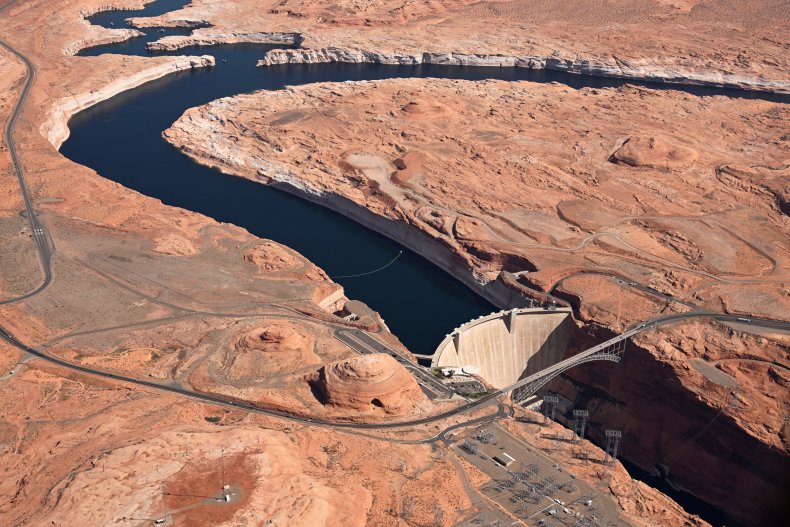Biden Administration to Pay Three States $1 Billion to Conserve Water
The Biden administration has reached a deal with three states to provide a temporary solution to the severe drought problem plaguing the Colorado River, the Interior Department (DOI) said Monday.
States in the lower Colorado River Basin reached a consensus after bickering for months about water cuts. Drought and overuse have depleted the river, which provides drinking water to the region's residents as well as irrigation for farms throughout the upper and lower Basin, which consists of Wyoming, Utah, Colorado, New Mexico, California, Arizona and Nevada.
The Lower Basin states—California, Arizona and Nevada—have long disagreed over who should be subjected to water cuts. California, which has been spared so far from cuts due to the water crisis, has argued that seniority water rights are the reason it shouldn't implement cuts. But Arizona and Nevada have already implemented severe cuts.
The three states reached an agreement with the Biden administration just days before a May 30 deadline. The DOI had proposed two approaches to reduce water use: either equal cuts to the three states or respecting water rights seniority, therefore imposing more cuts on Nevada and Arizona. The DOI invited the states to provide comments on the two approaches before the May 30 deadline.

Instead, the Lower Basin states compromised on a solution that will conserve 3 million acre-feet of water through 2026 in exchange for federal compensation.
Under the new agreement, the Biden administration agreed to compensate the Lower Basin states for three-quarters of the conserved water, totaling at least $1 billion to $1.2 billion in federal funds, according to The Washington Post. The funds, which will be provided through 2022's Inflation Reduction Act, will be used to compensate organizations and farmers who voluntarily reduce their water usage.
"Today's agreement between the Department of the Interior and seven Colorado River Basin states on a consensus-based approach marks an important step forward in our efforts to protect the stability of the Colorado River System in the face of climate change and historic drought conditions," President Joe Biden said in a statement on the White House's website.
He continued: "Thanks to my Investing in America agenda, we are deploying record resources to support water conservation and improve the Colorado River's long-term sustainability. This approach will benefit the 40 million people who rely on the Colorado River Basin for agriculture, drinking water, and power, and is a critical step to building a sustainable, resilient future for states, Tribes and communities throughout the West."
The DOI withdrew its other proposals and agreed to advance the three states' proposal and finalize the process later this year. The deal allows more time for states to devise a better plan to address the regional drought while preserving the Colorado River and its two largest reservoirs, Lake Mead and Lake Powell. Both reservoirs have dwindled to nearly dead-pool levels, a critical level in which water in a reservoir can no longer flow downstream from a dam.
Although some of the West's drought problems were assuaged by a series of atmospheric rivers that pummeled California over the winter, many experts argue that the only way to preserve the river's water is by reducing usage.
Jay Lund, a University of California, Davis professor and the vice director for the Center of Watershed Sciences, called the temporary progress "useful" but said the "precedence could be frightening for the long term."
"If the precedence is set that the federal government is willing to pay users very well for reducing use, then the long-term settlement of this issue will become either very expensive or much more difficult to negotiate as parties stall waiting to be paid with more federal money," Lund told Newsweek.
Update, 05/22/23, 4:08 p.m. ET: This story has been updated to include a statement from the White House and from Jay Lund.








